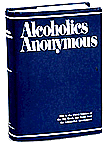

The Healer- Bill Wilson
From Time Magazine's "Heroes of the Century" By Susan Cheever

William G. "Bill W" Wilson
From the rubble of a wasted life, he overcame alcoholism and founded the 12-step program that has helped millions of others do the same
Listen To Bill W. Tell the Story of AA and Its Beginnings
Second Lieut. Bill Wilson didn't think twice when the first butler he had ever seen offered him a drink. The 22-year-old soldier didn't think about how alcohol had destroyed his family. He didn't think about the Yankee temperance movement of his childhood or his loving fiance Lois Burnham or his emerging talent for leadership. He didn't think about anything at all. "I had found the elixir of life," he wrote. Wilson's last drink, 17 years later, when alcohol had destroyed his health and his career, precipitated an epiphany that would change his life and the lives of millions of other alcoholics. Incarcerated for the fourth time at Manhattan's Towns Hospital in 1934, Wilson had a spiritual awakening -- a flash of white light, a liberating awareness of God -- that led to the founding of Alcoholics Anonymous and Wilson's revolutionary 12-step program, the successful remedy for alcoholism. The 12 steps have also generated successful programs for eating disorders, gambling, narcotics, debting, sex addiction and people affected by others' addictions. Aldous Huxley called him "the greatest social architect of our century."
William Griffith Wilson grew up in a quarry town in Vermont. When he was 10, his hard-drinking father headed for Canada, and his mother moved to Boston, leaving the sickly child with her parents. As a soldier, and then as a businessman, Wilson drank to alleviate his depressions and to celebrate his Wall Street success. Married in 1918, he and Lois toured the country on a motorcycle and appeared to be a prosperous, promising young couple. By 1933, however, they were living on charity in her parents' house on Clinton Street in Brooklyn, N.Y. Wilson had become an unemployable drunk who disdained religion and even panhandled for cash.
Inspired by a friend who had stopped drinking, Wilson went to meetings of the Oxford Group, an evangelical society founded in Britain by Pennsylvanian Frank Buchman. And as Wilson underwent a barbiturate-and-belladonna cure called "purge and puke," which was state-of-the-art alcoholism treatment at the time, his brain spun with phrases from Oxford Group meetngs, Carl Jung and William James' "Varieties of Religious Experience," which he read in the hospital. Five sober months later, Wilson went to Akron, Ohio, on business. The deal fell through, and he wanted a drink. He stood in the lobby of the Mayflower Hotel, entranced by the sounds of the bar across the hall. Suddenly he became convinced that by helping another alcoholic, he could save himself.
Through a series of desperate telephone calls, he found Dr. Robert Smith, a skeptical drunk whose family persuaded him to give Wilson 15 minutes. Their meeting lasted for hours. A month later, Dr. Bob had his last drink, and that date, June 10, 1935, is the official birth date of A.A., which is based on the idea that only an alcoholic can help another alcoholic. "Because of our kinship in suffering," Bill wrote, "our channels of contact have always been charged with the language of the heart."
The Burnham house on Clinton Street became a haven for drunks. "My name is Bill W., and I'm an alcoholic," he told assorted houseguests and visitors at meetings. To spread the word, he began writing down his principles for sobriety. Each chapter was read by the Clinton Street group and sent to Smith in Akron for more editing. The book had a dozen provisional titles, among them "The Way Out" and "The Empty Glass." Edited to 400 pages, it was finally called "Alcoholics Anonymous," and this became the group's name.
But the book, although well reviewed, wasn't selling. Wilson tried unsuccessfully to make a living as a wire-rope salesman. A.A. had about a hundred members, but many were still drinking. Meanwhile, in 1939, the bank foreclosed on the Clinton Street house, and the couple began years of homelessness, living as guests in borrowed rooms and at one point staying in temporary quarters above the A.A. clubhouse on 24th Street in Manhattan. In 1940 John D. Rockefeller Jr. held an A.A. dinner and was impressed enough to create a trust to provide Wilson with $30 a week -- but no more. The tycoon felt that money would corrupt the group's spirit.
Then, in March 1941, The Saturday Evening Post published an article on A.A., and suddenly thousands of letters and requests poured in. Attendance at meetings doubled and tripled. Wilson had reached his audience. In "Twelve Traditions," Wilson set down the suggested bylaws of Alcoholics Anonymous. In them, he created an enduring blueprint for an organization with a maximum of individual freedom and no accumulation of power or money. Public anonymity ensured humility. No contributions were required; no member could contribute more than $1,000.
Today more than 2 million A.A. members in 150 countries hold meetings in church basements, hospital conference rooms and school gyms, following Wilson's informal structure. Members identify themselves as alcoholics and share their stories; there are no rules or entry requirements, and many members use only first names.
Wilson believed the key to sobriety was a change of heart. The suggested 12 steps include an admission of powerlessness, a moral inventory, a restitution for harm done, a call to service and a surrender to some personal God. In A.A., God can be anything from a radiator to a patriarch. Influenced by A.A., the American Medical Association has redefined alcoholism as a chronic disease, not a failure of willpower.
As Alcoholics Anonymous grew, Wilson became its principal symbol. He helped create a governing structure for the program, the General Service Board, and turned over his power. "I have become a pupil of the A.A. movement rather than the teacher," he wrote. A smoker into his 70s, he died of pneumonia and emphysema in Miami, where he went for treatment in 1971. To the end, he clung to the principles and the power of anonymity. He was always Bill W., refusing to take money for counseling and leadership. He turned down many honors, including a degree from Yale. And he declined this magazine's offer to put him on the cover -- even with his back turned.
Susan Cheever, a novelist and memoirist, is the author of Note Found in a Bottle: My Life as a Drinker
Index of AA History Pages on Barefoot's Domain
As in so many things, especially with we alcoholics, our History is our Greatest Asset!.. We each arrived at the doors of AA with an intensive and lengthy "History of Things That Do Not Work" .. Today, In AA and In Recovery, Our History has added an intensive and lengthy "History of Things That DO Work!!" and We will not regret the past nor wish to shut the door on it!!
ABC Page 60 from the Big Book
KEEP COMING BACK!
ONE DAY AT A TIME!
 Barefoot's World
Barefoot's World

On the Web May, 2006 in the Spirit of Cooperation
Three mighty important things, Pardn'r, LOVE And PEACE and SOBRIETY

|



